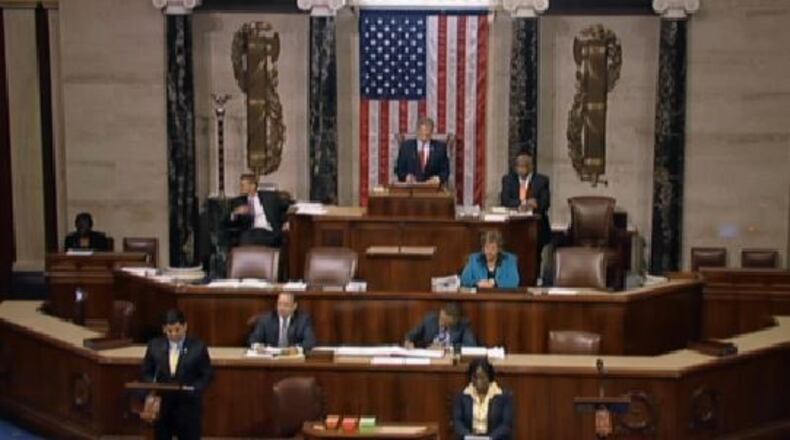After several long days of legislative work on the floor of the House, lawmakers are ready Thursday to give approval to a new long-term bill that authorizes fresh funding for road and bridge construction, the first big measure considered under the new leadership of Speaker Paul Ryan.
“We’re opening up the process," Ryan said of the highway bill, as he emphasized there would be "lots of amendments."
"We’re allowing members to participate in a way that the Founders intended, and we’re advancing an issue that is a big priority to the hardworking taxpayers of this country," the new Speaker told reporters.
But when you dig down into the details of the amendments that reached the House floor over the past three days, it may seem to you that lawmakers were nibbling around the edges more than anything else.
The most newsworthy item may have been the House voting to reject a plan that would have allowed larger and heavier trucks on roads; but most other amendments were minor in nature, some more parochial.
Here's a snapshot:
Massie (R-KY), Lofgren (D-CA), Eshoo (D-CA) - Amendment No. 7 - Allows the GSA to construct, install, and operate electric car charging stations on federal properties for use by employees. The construction, installation, and operation will be funded solely through user fees, so taxpayers will incur no cost.
Fleischmann (R-TN) - Amendment No. 8- Report language encouraging the use of geosynthetic materials and other innovative technologies.
Gibbs (R-OH), Napolitano (D-CA) - Amendment No. 9-Requires the Secretary of Transportation to study the methods State's use to procure culvert and storm sewer materials, and report their findings to the Transportation and Infrastructure Committee.
Gibson (R-NY), Maloney, Sean (D-NY), Nadler (D-NY) - Amendment No. 10 - Directs the Secretary of Transportation to develop a comprehensive strategy, within 1 year, to address "structurally deficient" and "functionally obsolete" bridges, as defined by the National Bridge Inventory, and to identify the unique challenges and policy solutions with regards to these respective categories.
Kirkpatrick (D-AZ) - Amendment No. 23 - Increases safety by allowing additional states that have passed distracted driving legislation to qualify for incentive grant funding
Duncan (R-TN) - Amendment No. 26 - Requires the Department of Transportation to conduct a study on the safety of operations of a double-decker motorcoach equipped with a luggage carrier at the rear of the vehicle.
Barletta (R-PA), Lipinski (D-IL) - Amendment No. 28 - Requires all legacy tank cars retrofit for continued Class 3 Flammable Liquid service to include enhanced top fittings protections for pressure relief valves.
Farenthold (R-TX), Babin (R-TX), Greene, Gene (D-TX) - Amendment No. 38 - Allows for only certain trucks with current weight exemptions to be allowed to continue riding at those higher weight exemptions once certain segments of Texas State Highways are converted into Interstate 69.
Beyer (D-VA) (As the designee for Van Hollen (D-MD)) - Amendment No. 42 - Removes a federal preemption and restore the full right to regulate towing to states and localities.
DeSantis (R-FL) - Amendment No. 29 - Empowers States with authority for most taxing and spending for highway programs and mass transit programs, and for other purposes.
That last amendment listed was as close as the House would get to addressing funding issues for highways - Democrats had sought to vote on a gas tax increase, but that was not made in order.
The DeSantis Amendment was a non-binding plan that advocated a phase-out of federal gasoline taxes, but it was rejected on a vote of 310-118.
So, lots of work on the floor of the House - lots of votes as well - but all that effort didn't exactly produce massive reform or change.
It reminded me of the first big week on the House floor for Speaker John Boehner in February of 2011, where the House approved a major set of budget savings, but balked at tackling major items, as lawmakers refused to add billions more in cuts.
"One final note about the level of cuts - despite a lot of talk by Republicans, they only added $622 million in cuts during four days of debate, as amendments for deeper cuts defeated repeatedly by the House," I wrote after midnight on Saturday, February 19, 2011.
About the Author
The Latest
Featured



